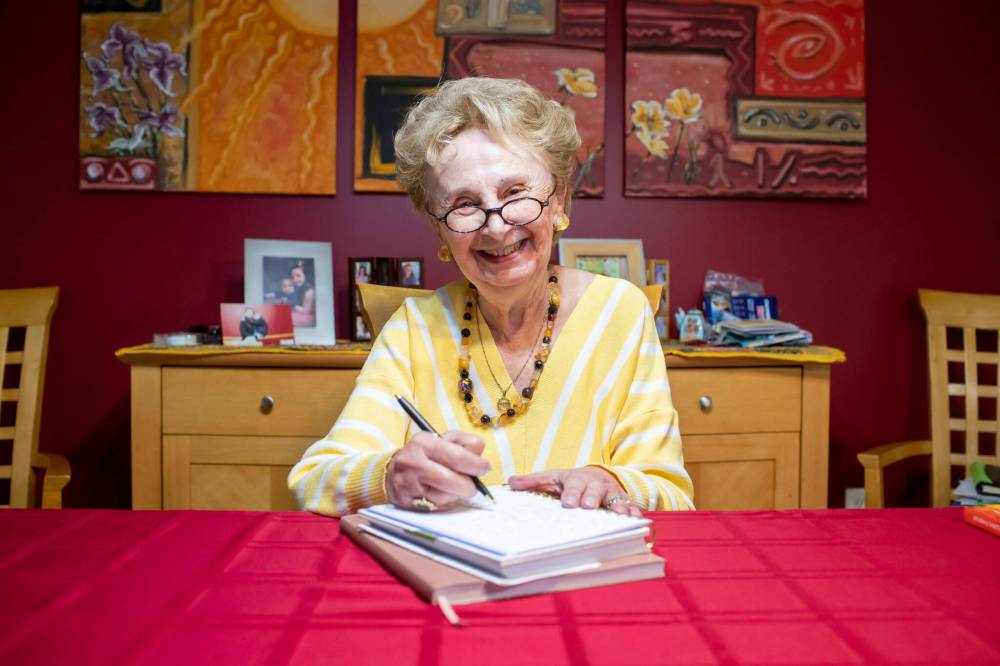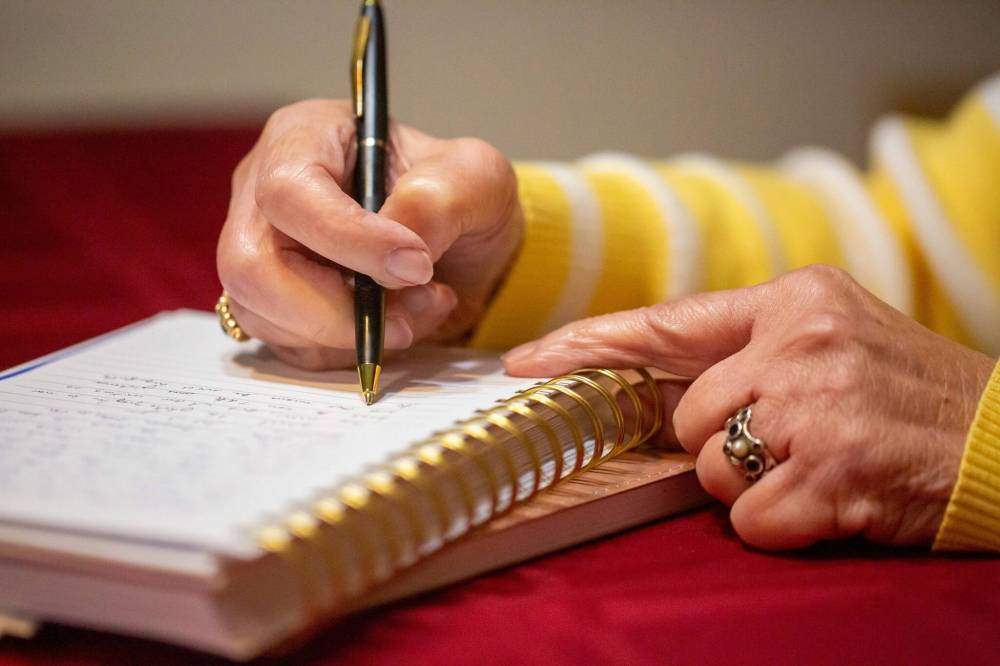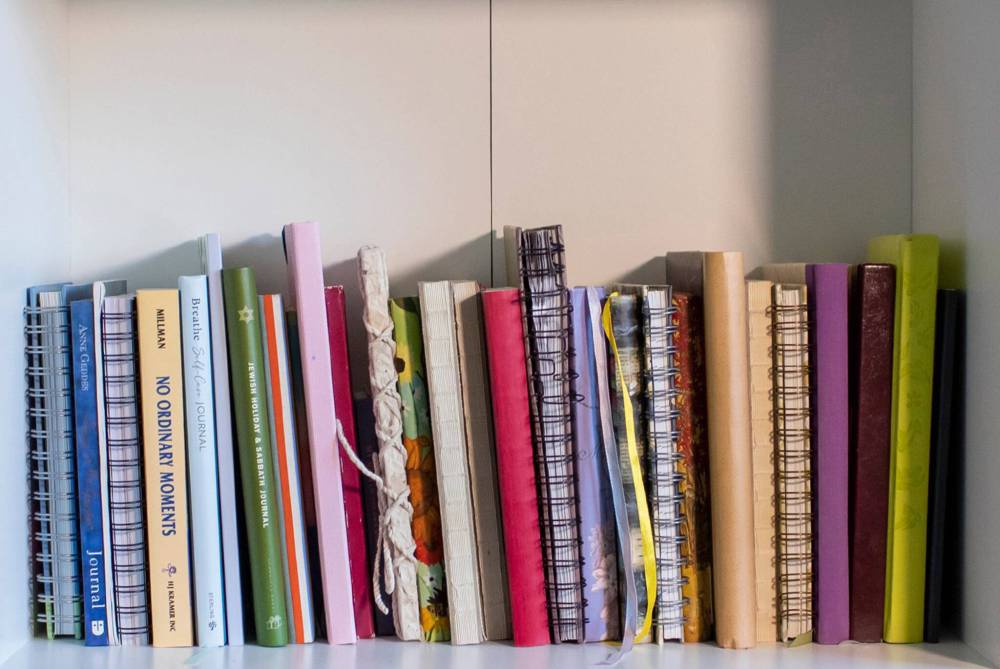The write stuff
Page by page, commitment to journaling pays lifelong dividends
Advertisement
Read this article for free:
or
Already have an account? Log in here »
To continue reading, please subscribe:
Monthly Digital Subscription
$0 for the first 4 weeks*
- Enjoy unlimited reading on winnipegfreepress.com
- Read the E-Edition, our digital replica newspaper
- Access News Break, our award-winning app
- Play interactive puzzles
*No charge for 4 weeks then price increases to the regular rate of $19.00 plus GST every four weeks. Offer available to new and qualified returning subscribers only. Cancel any time.
Monthly Digital Subscription
$4.75/week*
- Enjoy unlimited reading on winnipegfreepress.com
- Read the E-Edition, our digital replica newspaper
- Access News Break, our award-winning app
- Play interactive puzzles
*Billed as $19 plus GST every four weeks. Cancel any time.
To continue reading, please subscribe:
Add Free Press access to your Brandon Sun subscription for only an additional
$1 for the first 4 weeks*
*Your next subscription payment will increase by $1.00 and you will be charged $16.99 plus GST for four weeks. After four weeks, your payment will increase to $23.99 plus GST every four weeks.
Read unlimited articles for free today:
or
Already have an account? Log in here »
According to scientific studies, journaling, the near-daily exercise of recording one’s private thoughts and experiences in handwritten form, has been proven to lower blood pressure, boost immunity and improve physical and mental well-being.
In Judy Goodman’s case, journaling, sometimes called writing therapy, can also lead to chance encounters in far-off locales.
Goodman, a retired preschool teacher, has been journaling religiously for the majority of her 80-plus years. Nary a day goes by, she reports, that she isn’t committing some occurrence in her life, no matter how big or small, to paper.

BROOK JONES/FREE PRESS
Winnipegger Judy Goodman, 82 — who has been journaling since she was 12 — jots down some thoughts and observations recently while at home.
The grandmother of three was vacationing in Ixtapa, Mexico, in 2001 when she pulled out one of her ever-present notebooks to jot down a few things, while she was enjoying her morning coffee.
At one point, a server refilling her mug nodded toward the lines on the page and asked what she was writing about. She informed him it was her journal. That caused him to smile broadly and announce that he, too, kept a day-to-day log of his feelings and activities.
Next, he introduced Goodman to the restaurant’s hostess, who, as it turned out, also journaled regularly.
As Goodman was preparing to leave, the server stopped by her table a final time. He introduced himself as José, telling her with a wink, “Don’t forget to write about me and how handsome I am.”
Consider it done, she promised him.
—-
Goodman, the second youngest of four siblings, grew up in the North End. Uncomfortable discussing her innermost thoughts with her parents or classmates, she began putting pen to paper at age 12, in an effort to “get it all out there.”
“I had no idea what I was doing; I was just writing about what was going on in my life, except not in a cute, ‘dear diary’ kind of way,” she says, noting she would no sooner finish scribbling out what she referred to as essays than she would ball up the individual pieces of foolscap and toss them in the trash, to ensure nobody else was privy to her sentiments.
“One time in my late teens I was very upset about something. It was so long ago I can’t tell you what it was, but I do remember writing about it for two hours at the kitchen table, while everybody in my family casually went about their business.”
When she was through, she stared down at what she had composed. It suddenly felt like a giant weight had been lifted off her shoulders, she recalls. That’s when it really dawned on her how cathartic the practice could be.
Goodman continued to pour her heart out in longhand after moving to Toronto at age 19 to study early-childhood education. That was around the time she began to hold on to her digests by filing each away in chronological order on a shelf in her apartment, the moment it was full.
“Even when I was at university I managed to write every single day,” says Goodman, dressed in a perfectly pressed lime-green blouse and matching slacks.

BROOK JONES/FREE PRESS
For the better part of her life, no matter where Judy Goodman was or what she was doing, she has methodically filled journals.
“The more I kept at it, the more I realized how important it was for my mental health… how necessary it had become to detail what I was feeling so I didn’t keep things bottled up inside. Honestly, I couldn’t figure out why everybody else wasn’t doing the same thing, it was helping me so much.”
Goodman moved back to Winnipeg shortly after the first nursery school program in Manitoba was established in 1965 at David Livingstone School. She caught on at Laura Secord School as a preschool instructor. Come lunch hour, she almost always headed to a nearby coffee shop where she would spend her entire break with pen in hand.
“It became a little tougher to find time after I got married and had kids,” says the mother of two.
“Sometimes I wrote first thing in the morning before anybody else was awake. Other times it was late at night, when everybody was asleep and I had the house to myself. Even if it was just for 20 minutes or so, I made sure to fit it into my day.”
Goodman was retired from teaching in the late 1990s when she received a phone call from her sister. Turn on the TV, her sibling told her, as Oprah Winfrey was devoting an entire episode of her daytime program to journaling, for which the talk-show host was apparently a strong advocate.
“When I was younger I thought I was the only person in the world who did this,” Goodman says, running a hand over a ring-bound tome.
“Hearing Oprah discussing it and giving it a name — at that point I still wasn’t calling it journaling — was so exciting.”
In 2004, Goodman, now divorced, thought it might be a good idea to share her insights on what was fast becoming a popular pastime with others. She spent a few months devising a curriculum for a multi-day workshop she planned to offer through the City of Winnipeg Leisure Guide, only to be chided by certain members of her family once they heard the news.
“I received very negative feedback, along the line of ‘you’re wasting your time,’ and ‘that’s a silly idea; what could you possibly teach others?’ but I persevered nonetheless. I had close to a dozen people in my first class — the evaluations were overwhelmingly positive — and I continued doing workshops right up until 2020, when COVID came along.”
In addition to workshops, which revolved around various exercises such as “sentence stems” (“When someone criticizes me I (fill in the blank)”) and “unsent letters” (a missive, positive or negative, to a person that will never be delivered), she managed to write a book, Journal Writing: The Healing Benefits.
The 270-page effort, which was published in 2014, includes examples of her own work as well as tips and tricks. Not that there are rights and wrongs when it comes to journaling, she’s quick to point out.

BROOK JONES/FREE PRESS
A collection of just a fraction of Goodman’s journals lines a bookshelf in her Winnipeg home.
“Spelling, sentence structure… none of that makes a difference. Even when I was doing the workshops, it was never expected that students would read anything aloud, for others to comment on or to offer advice. journaling is so very private and personal. All I was doing was trying to make sure people taking the class understood the process.”
Goodman considered resurrecting the workshops in 2022. Except by then, she had assigned herself a fresh project. Because her penmanship isn’t “the best,” she had undertaken the task of transferring close to 60 years worth of writings onto her computer, in the event her children or grandchildren are ever interested in reading the lot, somewhere down the line.
She is currently up to 2009, with dozens of notebooks and hundreds of pages still to go. (As for writing tools, she’s never been particularly fussy. On the day we chatted, she was about to crack open a new log, one with members of Swedish pop group ABBA gracing the cover, a gift from a friend.)
“If there’s one thing I’ve learned about myself while typing everything out, it’s how repetitive I could be when something was really bothering me,” she says, laughingly labelling her undertaking as The Autobiography of Judy Goodman.
“There were occasions when I went on for days and days about the very same subject, so I’ve been doing a lot of self-editing, so it isn’t so boring.”
In addition to any health benefits, Goodman mentions there has also been a practical advantage resulting from her decades of journaling. In her opinion, writing things down is a tremendous memory tool. Not only can she still tell you precisely how she felt on one of her kids’ first days at school, or after the loss of a loved one, she has proven her theory time and time again, in a manner most of us can relate to.
“There have definitely been days when I’ve made out a grocery list only to get to the store and realize I left it at home. But because I took the time to write everything down, I’m always able to remember every single item I need.”
david.sanderson@freepress.mb.ca
Dave Sanderson was born in Regina but please, don’t hold that against him.
Our newsroom depends on a growing audience of readers to power our journalism. If you are not a paid reader, please consider becoming a subscriber.
Our newsroom depends on its audience of readers to power our journalism. Thank you for your support.


